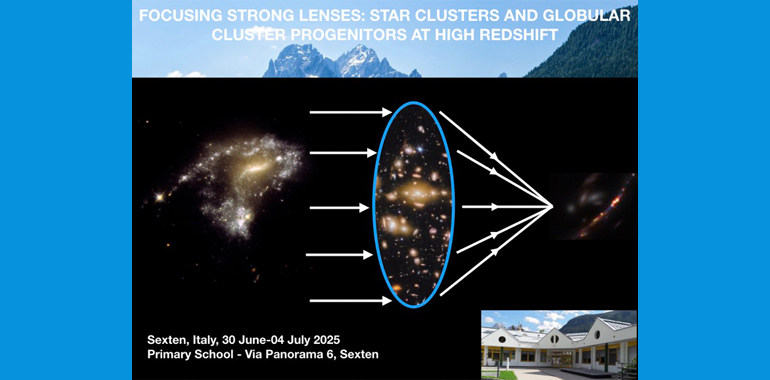
Focusing strong lenses: star clusters and globular cluster progenitors at high redshift
LOCATION: Sexten Primary School - Via Panorama 6, Sexten
DETAILS
Thanks to their tremendous magnifying power, strong gravitational lenses have improved our knowledge of the high-redshift Universe down to the scales of multiple stellar systems or even single stars. After the launch of the JWST, the last few years have seen a significant increase in the number of known strong lenses, potentially accompanied by an extraordinary abundance of new information. This wealth of data poses new challenges, as extracting the desired information requires accurate strong lensing models. In conjunction with this issue, another significant challenge focuses on unravelling the origin of globular clusters (GCs) and the presence of multiple stellar populations within them. Despite the wealth of observational data collected on local GCs, each system appears to have lost memory of the initial conditions from which it originated. The discovery of the precursors of GCs at high redshifts has opened an entirely new perspective. Such discovery has driven a great deal of theoretical work, whose ambitious goal is resolving the formation of star clusters in cosmological simulations. However, it is still hard to resolve star cluster formation due to significant uncertainties affecting the main processes that regulate it, such as stellar feedback. The aim of this workshop is to bring together the power of strong lensing, the richness of data of local GCs and high-resolution galaxy formation models. Astronomers active in these fields will meet to foster new joint collaborative efforts and improve our understanding of these topics.
RELATED FILES
No files available yet.
FEE
WORKSHOP CODE FOR BUS AND PAYMENT
FSL25
ORGANIZERS
- Francesco Calura, INAF-OAs, Bologna, Italy
- Anna Lisa Varri, University of Edinburgh, Scotland, UK
- Claudio Grillo, Universita’ di Milano, Italy
- Piero Rosati, Università di Ferrara, Italy
- Marta Reina Campos, McMaster University, Canada
- Carlo Nipoti, Universita’ di Bologna, Italy
- Anita Zanella, INAF-OAPd, Padova, Italy
